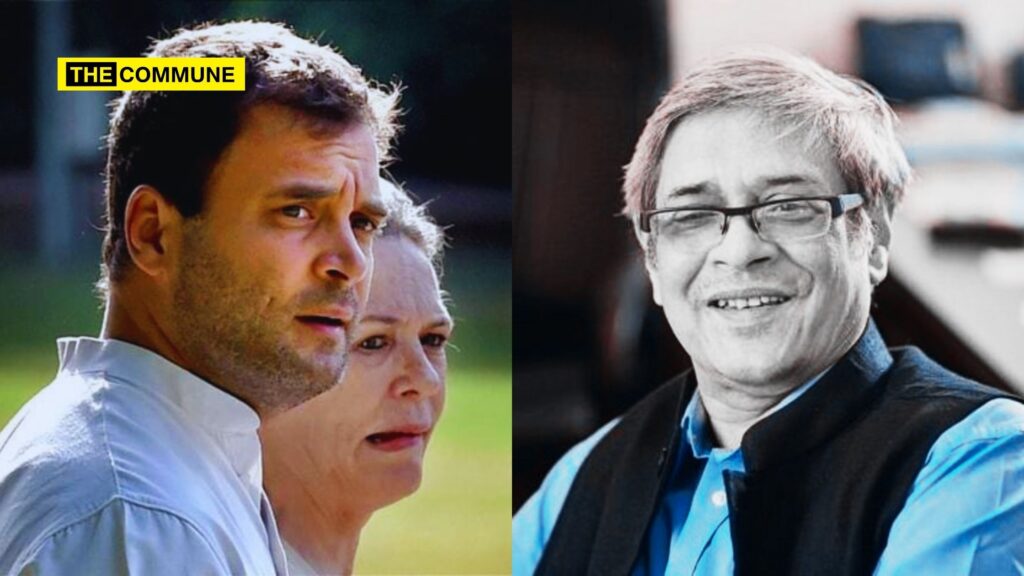On 1 November 2024, Bibek Debroy—renowned economist, prolific author, and former Niti Aayog member—passed away, leaving a profound impact on India’s economic and intellectual circles. Yet, amidst the tributes from various political leaders and public intellectuals, a noticeable silence came from the Congress party’s leaders, including the leader of the opposition in Parliament, Rahul Gandhi, who neither issued a statement nor expressed public condolences. This silence has sparked debate, especially given Debroy’s own controversial history with Congress leadership over intellectual autonomy and freedom of expression. Was this the reason why the Gandhi family did not condole his death?
Debroy vs Sonia Gandhi
Debroy, an eminent economist, had a reputation for speaking truth to power. During his tenure as the director of the Rajiv Gandhi Institute for Contemporary Studies (RGICS), as reported in India Today, he encountered political interference firsthand. Originally established as an independent think tank, RGICS was often viewed as an intellectual arm of the Congress party, with Sonia Gandhi serving as its chairperson. Debroy’s tenure was marked by attempts to make the institute self-financed and independent, a move that faced resistance from within. He argued that for RGICS to succeed as a credible, self-sustaining institution, it needed to shed its image as a Congress-aligned entity. This approach, however, often put him at odds with Congress leaders, who, according to Debroy, sought control over the institute’s intellectual direction.
In an interview with journalist Karan Thapar, Debroy recounted instances of political intervention, such as when he invited Dr. Seshadri Chari, the editor of the right-leaning Organiser newspaper, to a conference on Indian society, politics, and reform in 2002. Debroy stated that he faced pushback from those aligned with Sonia Gandhi, who advised him to rescind the invitation. He held firm, allowing Chari to participate, but recalled, “There were people who spoke on behalf of Mrs. Gandhi and said, ‘Please do not invite Seshadri Chari.’ I stuck to my guns.” This incident underscored what Debroy saw as a culture of intellectual intolerance within Congress-aligned circles, and it would not be his last encounter with such pressures.
A more severe clash occurred in 2005 when Debroy and colleague Loveesh Bhandari published a report ranking Gujarat as the top state in India for economic freedom. At the time, Gujarat was led by then-Chief Minister Narendra Modi, a controversial figure for Congress. The report’s findings, published just before the Gujarat municipal elections, sparked significant backlash. Debroy recounted receiving a directive on official Congress stationery, signed by Sonia Gandhi herself, mandating that all future RGICS publications undergo political vetting. “This was not acceptable to me,” Debroy said. Shortly after, he resigned from RGICS.
Debroy’s criticisms extended beyond his personal experiences at RGICS. He highlighted a pattern of intellectual intolerance that, in his view, had persisted for decades in Indian academia. He cited several examples, such as economist Jagdish Bhagwati, who reportedly left the Delhi School of Economics under pressure due to his differing viewpoints, and Dr. Bellikoth Ragunath Shenoy, a member of the committee evaluating India’s Second Five-Year Plan who faced ostracization for opposing the economic policies favored by the then-government. According to Debroy, Dr. Shenoy was effectively blacklisted, unable to secure work in India, and eventually had to move to Sri Lanka.
Debroy’s Outspoken Nature
His outspoken nature also extended to defending others. In a notable instance, he criticized how the Ministry of Finance treated economist Jean Dreze after Chief Economic Adviser Arvind Subramanian invited him to the Delhi Economic Conclave, only to rescind the invitation abruptly while Dreze was en route to Delhi. Debroy publicly suggested that Subramanian apologize, highlighting a need for greater transparency and respect within government processes.
Debroy also spoke of a broader historical context for intolerance, stating that it was not a recent issue but an ingrained problem in Indian society. “Intolerance has always existed, and we would be foolish not to recognize it,” he remarked in an interview with The Times of India. He pointed to academic examples, such as textbook restrictions that selectively highlight certain historical narratives over others, particularly those related to southern Indian dynasties versus the Mughal era. Debroy argued that an ideological monopoly in Indian intellectual discourse maintained through political networks had created a climate where dissenting voices were unwelcome.
India’s political and intellectual circles have long grappled with the delicate balance between state influence and intellectual independence, and Debroy’s passing underscores these issues. In recent years, a growing number of the Award-wapsi gang of scholars expressed concerns about “ideological hegemony“, including more than 100 Indian and international academics who signed statements “condemning rising intolerance“. Debroy’s views offer a counter-narrative, emphasizing that such intolerance is not new and has manifested across political regimes.
The absence of a condolence message from the top Congress leaders, barring the only message by senior leader Jairam Ramesh upon Debroy’s death, has prompted questions about whether unresolved ideological divides are behind their silence.
A man of unusually wide-ranging interests, Bibek Debroy was first and foremost a fine theoretical and empirical economist who worked and wrote on various aspects of the Indian economy. He also had a special skill for lucid exposition, in a manner that would make laypersons easily…
— Jairam Ramesh (@Jairam_Ramesh) November 1, 2024
For many, this episode reflects deeper concerns about how political influence shapes responses to intellectual figures in India and whether ideological conflicts limit acknowledging an individual’s contributions based on political alignments.
Subscribe to our Telegram, WhatsApp, and Instagram channels and get the best stories of the day delivered to you personally.

